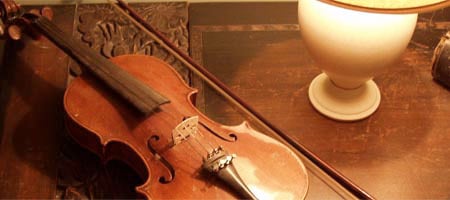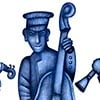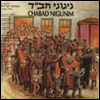Like many Jews last summer, Israeli-born Yuval Yaron felt a terrible sinking feeling as his homeland fell into turmoil and went to war with Lebanon. And like the many violinists and storytellers before him, world-renowned University of California at S. Barbara professor used this somber time to compose music, finding peace at the throat of his instrument.
But the acclaimed musician, who burst into the musical world at 16 with the Israel Philharmonic Orchestra, probably never predicted that during these dark hours he would rediscover his heritage. This rebirth would slowly materialize as he composed haunting melodies of Chassidic nigunim, or spiritual tunes, the majority of which have no words.
"I was introduced to the nigun by Rabbi Yosef Loschak of S. Barbara's Chabad chapter," says Yaron. "[While] hearing him and many of his young children sing on those Shabbatot and holidays, it went through my ears and straight to my bloodstream, into my kishkes."
Loschak's son, Rabbi Mendel Loschak was not one of the children that inspired Yaron back then; it was, instead, the musician who inspired him and his students, says Loschak, the co-director of the UCSB Chabad House.
"I was deeply moved by his music," says Loschak, who attended a concert of Yaron's last semester that featured his rendition of classic nigunim. He even advertised for the event, which drew a crowd of about 200.
"Students were also affected by the music," continues the rabbi. "Some asked to get a CD."
After discovering himself the power of these melodies several years ago, Yaron happily added them to his robust repertoire. The often wordless arrangements, played mainly during large gatherings of Chassidic Jews, gave Yaron a welcome task in a time of great instability.
"As the war was raging in Israel last summer, the news was bleak and the spirit was aching," relates the violinist. "I found the process of arranging the nigun for violin to be most healing during that stressful period. It pushed despair aside and replaced it with joy, hope and a sense of belonging. It also gave me a closeness to my heritage like never before."
Such is the life of Yaron, who counts Jascha Heifetz and Sergei Rachmaninoff as a few of his favorite musical storytellers. Born in Petach Tikva, Israel in 1953, Yaron grew up watching the contemporary greats perform with the Israel Philharmonic before he joined the orchestra itself.
Each concert to Yaron was more than just musically inspiring; he describes each one, in fact, as a "real event" in his life. But it was during his solo performance of a Mendelssohn concerto in Jerusalem at the age of 16 when he decided to pursue the violin.
"I believe I was hooked," he says.
It makes sense, says Loschak.
"When words won't suffice to properly express the soul," he explains, "we reach deep inside and sing a nigun.
"At the Chabad House," he continues, "sometimes a student's favorite part of the Shabbat dinner is the singing of nigunim."
A Journey Towards Meaning
Yaron honed his craft at Tel Aviv's Rubin Academy and boasts a long, distinguished slate of performances with some of the world's best orchestras in far-flung places like Tokyo and Basel. He started teaching 30 years ago at Indiana University's school of music and accepted a position as a distinguished professor of violin at USCB in 2001.
But after so many years of playing partitas of Bach and the sonatas of Vivaldi, Yaron found that this classical training ultimately gave him the focus and framework to compose nigunim.
"In my arrangements, I have used all the skills and knowledge I have gained by playing the standard violin repertoire at the service of those magnificent and simple melodies," he explains.
One of Yaron's career highlights was undoubtedly his prize-winning performance at Helsinki's Jean Sibelius competition, an international violin competition touted as one of the top three in the world. But though he walked away as a prestigious Sibelius laureate in 1975, his Jewish identity truly began to materialize during a trip to a Nazi death camp.
"In 1978 I played in Munich with the Bavarian Radio Orchestra," he reveals. "A couple of days earlier I visited Dachau concentration camp, which is a 20 minute drive from Munich."
In those moments, slowly moving across the grounds where thousands of Jews had perished, he was forever changed. He walked away with an even stronger identity of being Jewish than ever before.
"The horror of the sites, which are impossible to put into words, have brought forth in me the realization that every living Jew has an obligation to affirm himself, his Jewishness and his neshama, or soul," he explains. "Every Jew has to use his G‑d given talents to the fullest and demonstrate the utter and total failure of that evil plan."
Today Yaron juggles between teaching the violin to UCSB students and performing classical and Jewish works throughout the world.
"I believe that music is a great vehicle by which one may tell or listen to a story in a way unachievable by words," he says. "I enjoy and seek music that will inspire me and connect to my inner self."







Join the Discussion